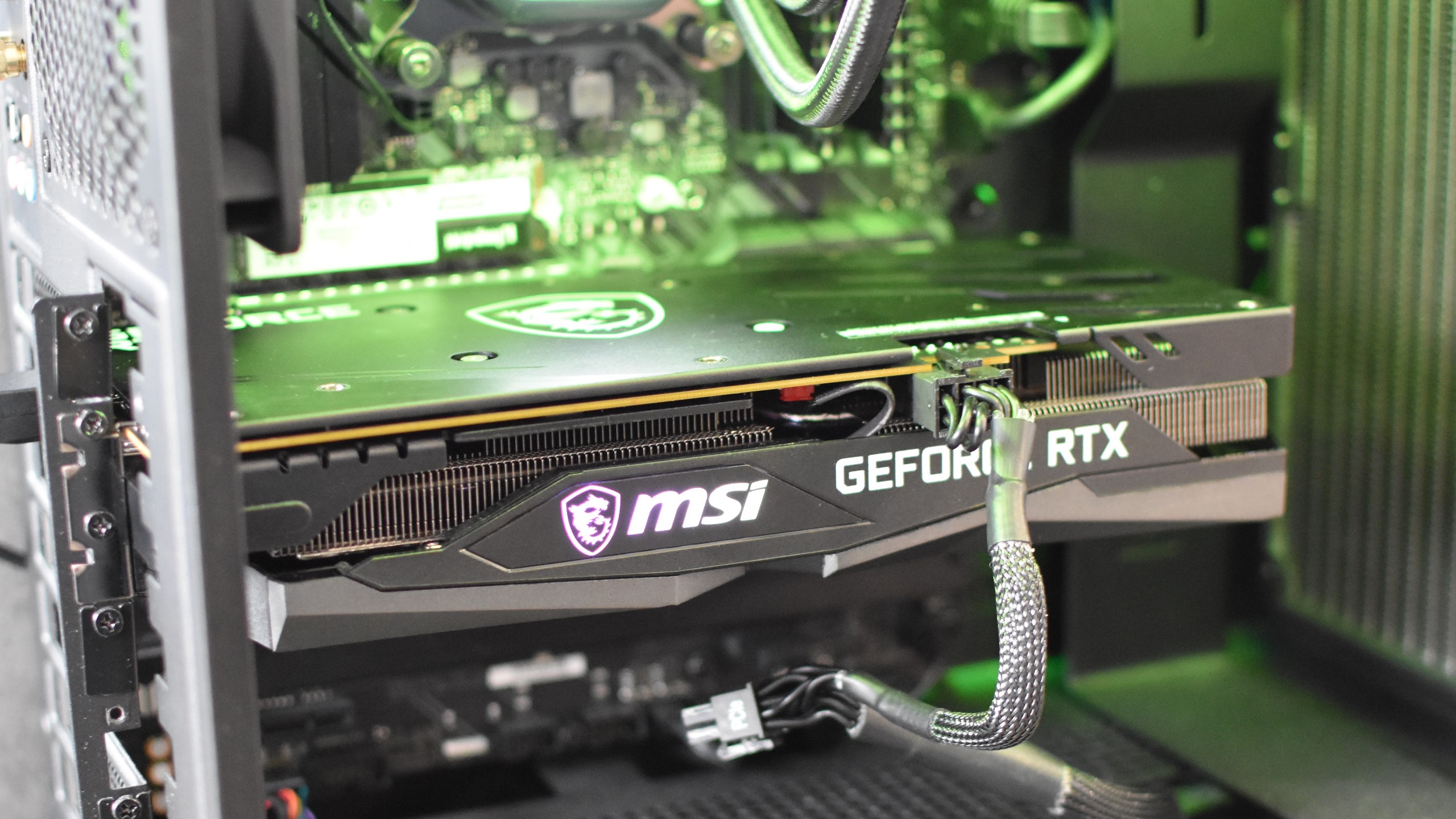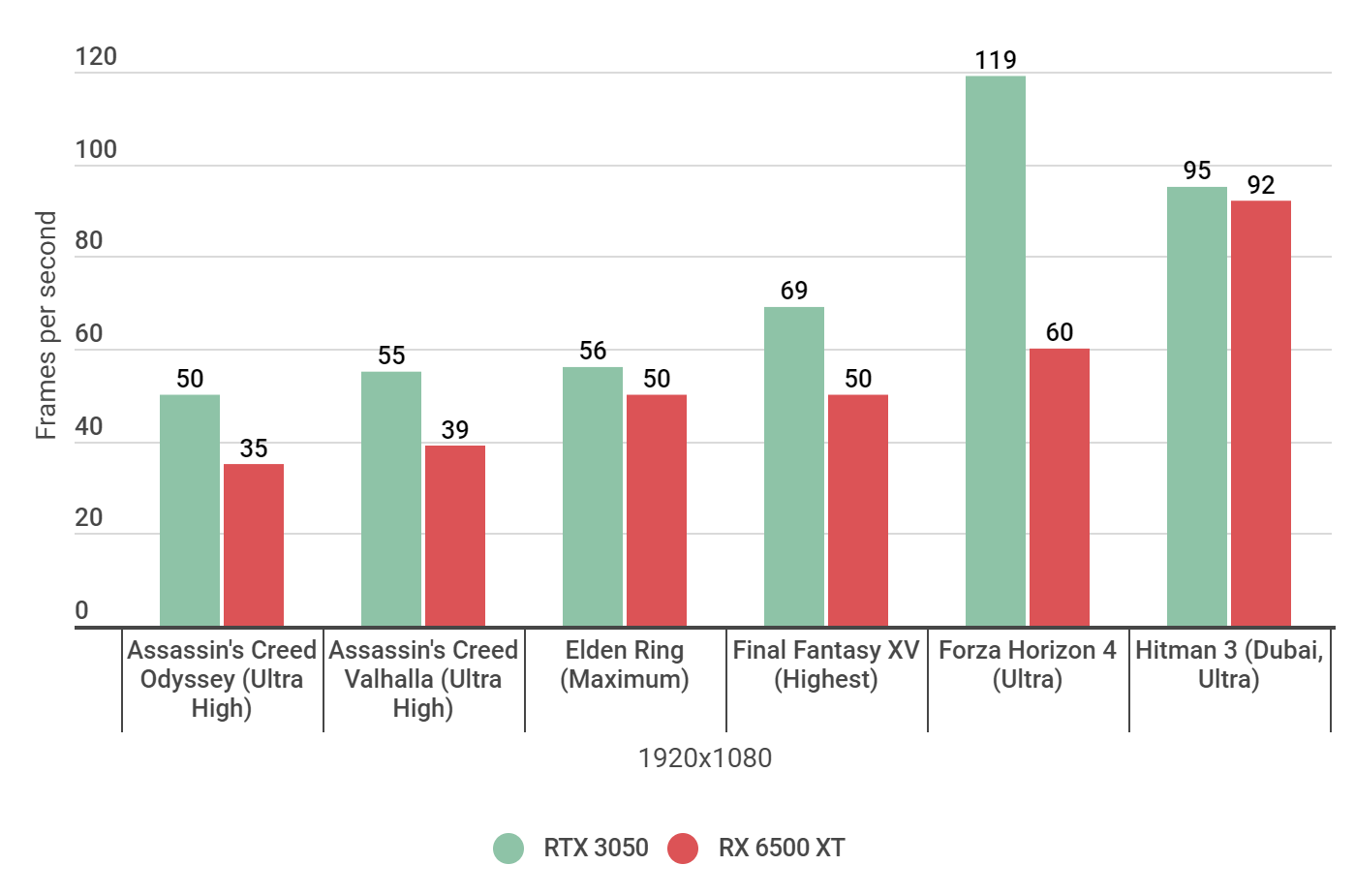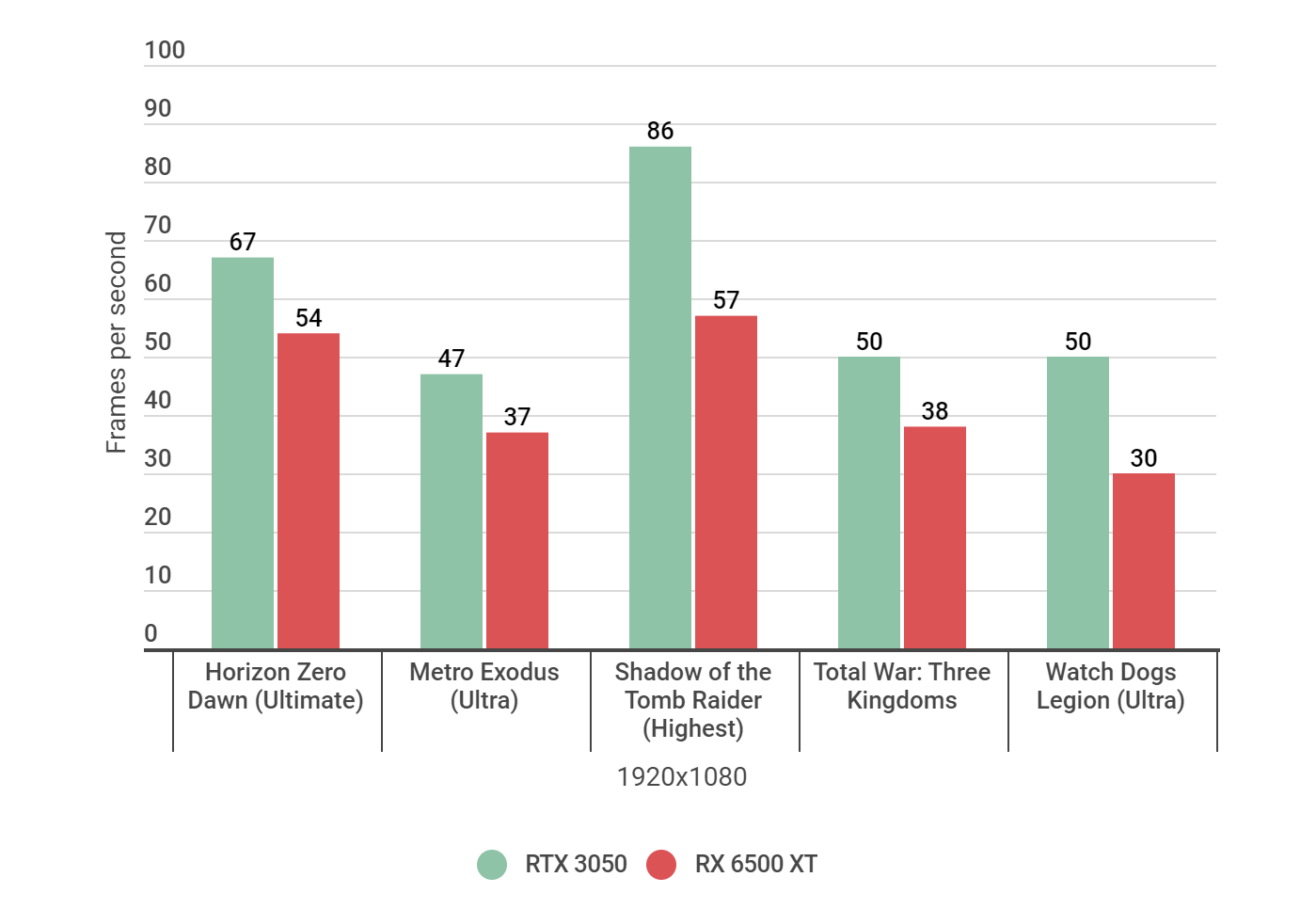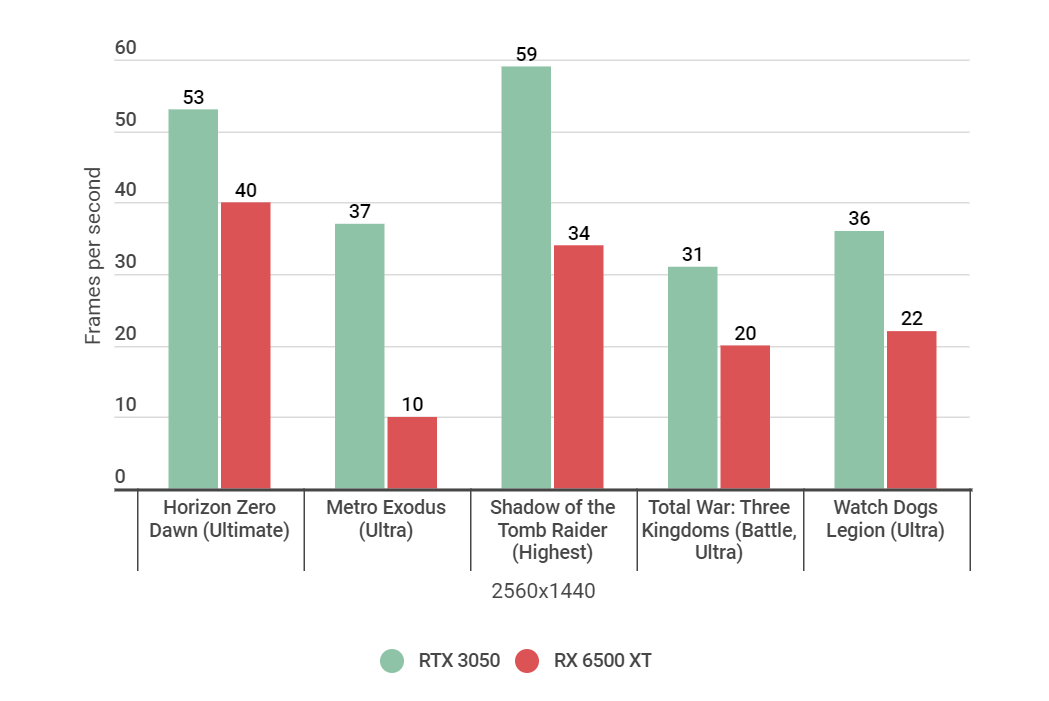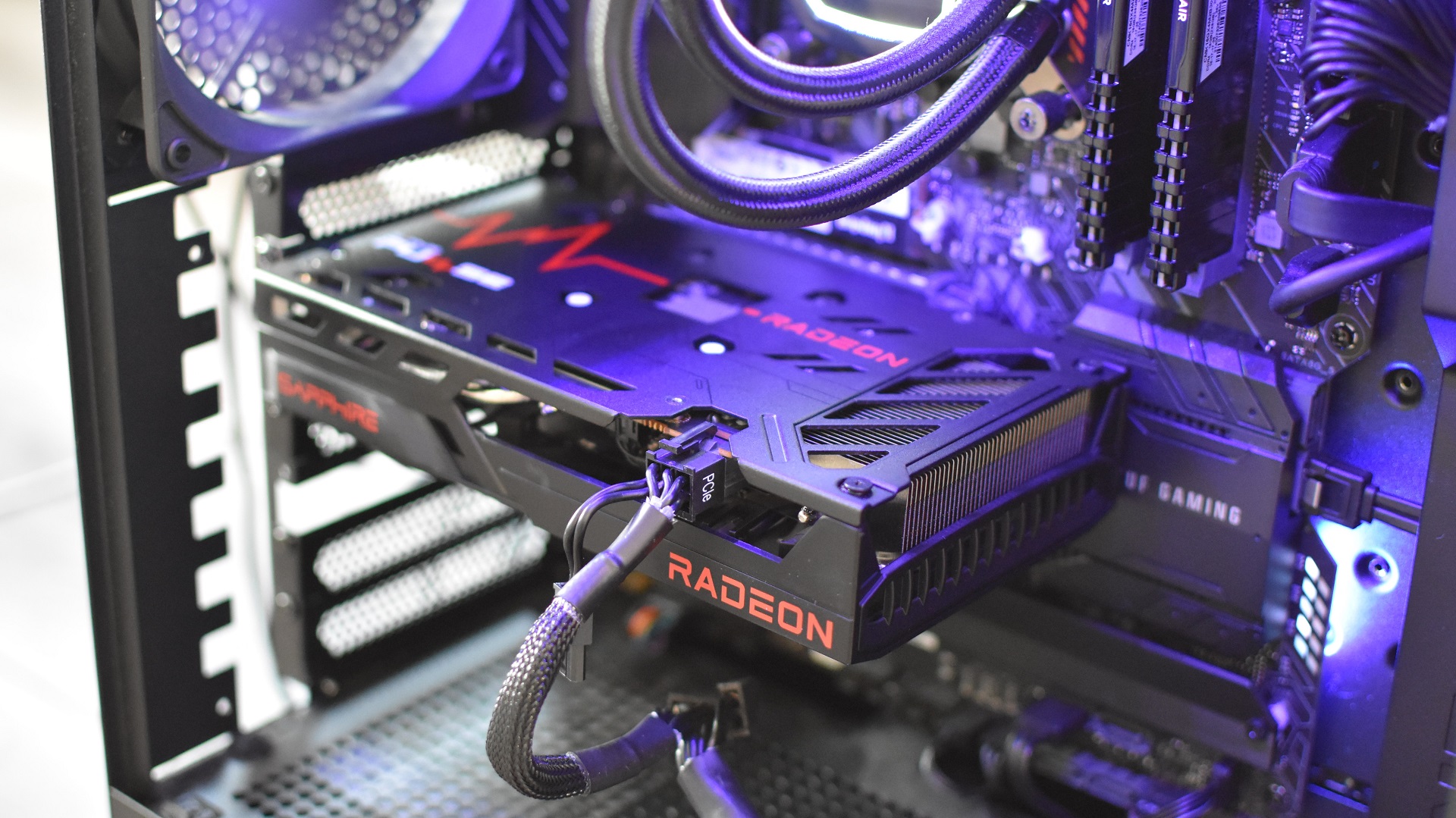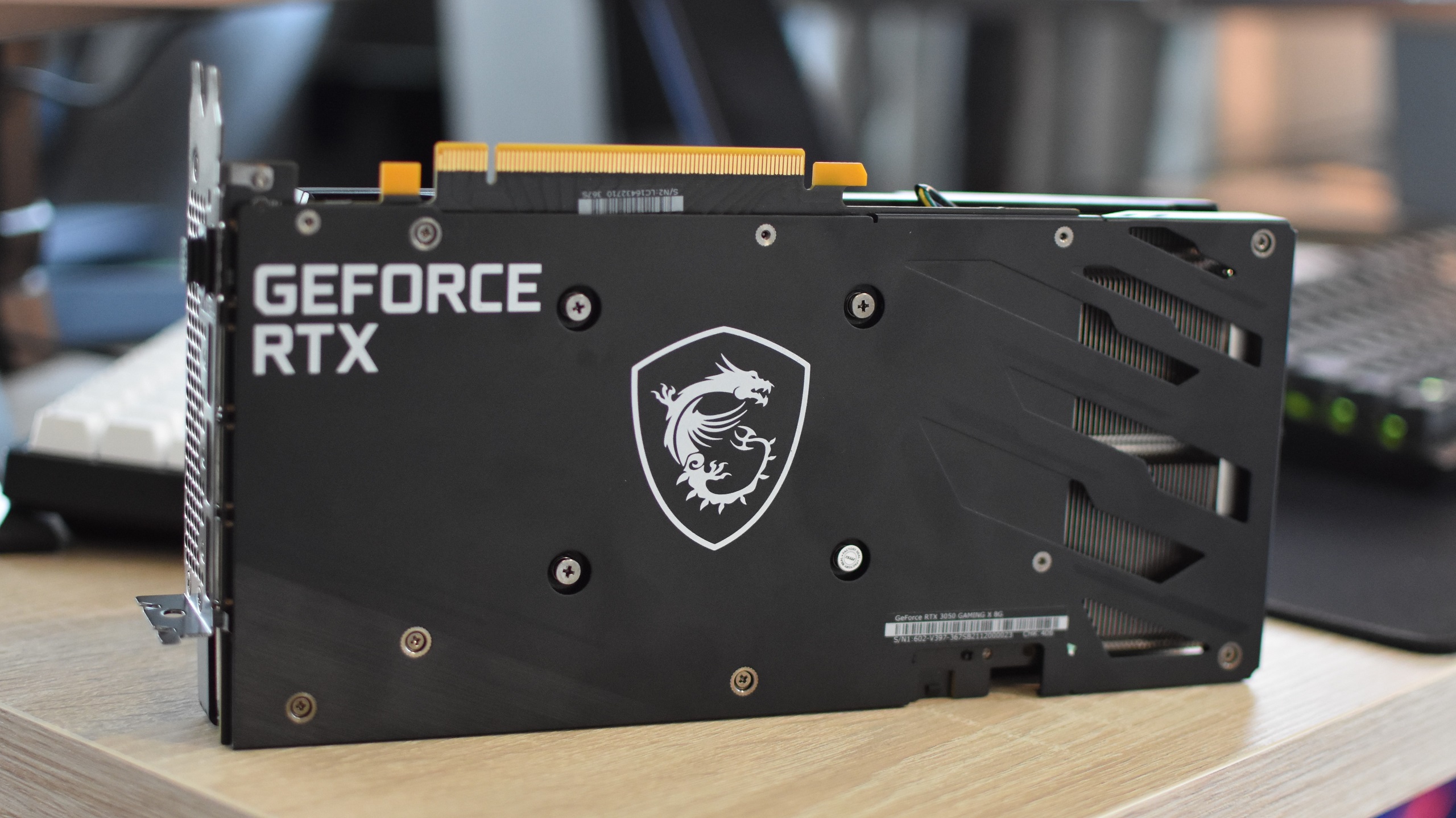Which, though, is the better buy? Both are 1080p-focused cards on sale for £300 or less, both sit at the bottom of their respective GPU hierarchies (the RTX 30 series and Radeon RX 6000 series), and both support ray tracing, so let’s break out the bar chart app and do some comparisons. Only one, of course, can be deserving of a spot on our best graphics cards list. If you haven’t read the full reviews then I won’t spoil which one it is, but here’s a clue: it’s an anagram of “RTX 3005”.
Nvidia GeForce RTX 3050 vs AMD Radeon RX 6500 XT: Price
If the RX 6500 XT has one thing going for it, it’s a much clearer dedication to being a budget GPU – at least by the deeply out-of-whack standards of 2022 prices. The Sapphire Pulse Radeon RX 6500 XT, the partner model I used for testing, also happens to be the lowest-priced model at £199 / $230 (a whole pound cheaper than it was yesterday!). That’s not just cheaper than the thriftiest RTX 3050 variant, it’s the least you have to pay for any current-generation GPU on the market. Indeed, the RTX 3050 starts from £270 / $325, with my test model – the MSI GeForce RTX 3050 Gaming X 8G – more like £380 / $339. The RX 6500 XT has more expensive partner cards too, but generally the RTX 3050 has been shunted much further from its original, £230 RRP. The RX 6500 XT, by contrast, can potentially be bought without getting gouged at all. Is anything over £150 stretching the definition of a “budget” graphics card? Yes. Is there wiggle room because of the economic nightmare that’s been engulfing PC hardware since 2020? Also yes. Like it or not, a return to the days of dirt-cheap but decently capable cards like the GTX 1050 Ti and Radeon RX 570 isn’t coming any time soon. Mathematically, the RX 6500 XT is just the next closest thing.
Nvidia GeForce RTX 3050 vs AMD Radeon RX 6500 XT: 1080p benchmarks
Unfortunately for the Radeon, being cheap and being good value aren’t always the same thing, something that becomes apparent though its gaming performance. Alone, the RX 6500 XT’s 1080p benchmark results look weak, with multiple games barely reaching 30fps on their highest graphical settings. Next to the RTX 3050, it’s a massacre. Alright, it’s close in Hitman 3’s Dubai benchmark, and close-ish in Elden Ring. In everything else, the RTX 3050 wins, and not just by a couple of frames per second – by big enough margins that you can see the difference with the most disrobed of naked eyes. Forza Horizon 4 and Shadow of the Tomb Raider, in particular, show how wide the speed gap can be. On average, the RTX 3050 was 37% faster than the RX 6500 XT in these tests. This might not sound all that superior when you’d be paying at least 50% more for the RTX 3050, but remember that even small frame rate differences can be clearly visible at 60fps and below, where these GPUs mostly reside. That 37% difference therefore represents a very visible, tangible difference in smoothness. The RX 6500 XT’s pants performance is largely down to a lack of bandwidth. It has just 4GB of VRAM and can only use four PCIe lanes (of the mobo slot’s available 16), while the RTX 3050 has 8GB of memory and supports eight PCIe lanes. And these results were recorded on a system that supports the PCIe 4.0 interface – when I tried the RX 6500 XT at PCIe 3.0 speeds, which most older motherboards will be limited to, frame rates dropped by as much as 50% in Metro Exodus. The RTX 3050 is naturally resistant to such drops as its own hardware isn’t as short on bandwidth.
Nvidia GeForce RTX 3050 vs AMD Radeon RX 6500 XT: 1440p benchmarks
Although neither of these graphics card really have 1440p in mind, it doesn’t hurt to cover yourself, should you ever wish to one of the best gaming monitors with a higher resolution. One again supported by its burlier specs, the RTX 3050 extends its average performance lead to 57% at 1440p, while the RX 6500 XT is left unable to even reach playable frame rates in the Assassin’s Creed series, Total War: Three Kingdoms, Watch Dogs and especially Metro Exodus. I don’t think “Ah, but you could just lower the settings to reach 30fps” is much of a defence for the RX 6500 XT either. The same settings tweaks would likely get these games closer to the 50-60fps range on the RTX 3050, which again, would be noticeably slicker than scraping by at 30fps. That’s not to say more easygoing games will struggle as badly as Metro and Three Kingdoms do. Hitman 3 comes close to the 60fps mark (as well as the RTX 3050’s 66fps), and 40fps in Horizon Zero Dawn isn’t awful. For a more futureproofed card, though, the RTX 3050 is an obviously better choice.
Nvidia GeForce RTX 3050 vs AMD Radeon RX 6500 XT: Features
Both of these GPUs can deploy upscaling to improve performance. The RTX 3050 is the first Nvidia XX50 graphics card to support DLSS, while the RX 6500 XT can call upon FSR. FSR 2.0 is launching soon as well, though like the current FSR, Nvidia cards will also be able to use this in whichever games support it – cards including the RTX 3050. FSR is worth turning on when you’re struggling, as seen in Horizon Zero Dawn, where the upscaler’s Ultra Quality setting boosted the RX 6400 XT from a 40fps average at 1440p up to 50fps. DLSS is still a superior bit of tech, however, to the point where it can be worth paying more specifically for it. DLSS is capable of similarly impactful performance improvements, and because it uses a smarter form of temporal upscaling (as well as its own built-in anti-aliasing) than FSR, its upscaled results are pretty much always sharper-looking with finer detail reproduction. In some cases, DLSS on its highest quality setting can even look better than native resolution. DLSS also comes in extremely handy for offsetting the performance loss from ray tracing, which both GPUs support and invariably scarfs a load of frames per second in whichever games include it. In fairness, FSR can perform the same FPS damage limitation role, but with the RX 6500 XT specifically, there’s so little power to begin with that enabling ray tracing is basically asking for trouble. The RTX 3050 is much, much better equipped for the strain of RT effects. Since Metro Exodus supports DLSS but not FSR, I tested it with upscaling off, and at 1080p with Ultra setting and Ultra-quality ray tracing, the RTX 3050 averaged 36fps - while the RX 6500 XT only averaged 13fps. So, while both GPUs can technically put ray tracing on their features list, it’s far, far more readily usable on the RTX 3050.
Nvidia GeForce RTX 3050 vs AMD Radeon RX 6500 XT: Conclusion
I’m aware of the irony in moaning about price inflation then immediately recommending the more expensive of two graphics cards. But when you look at just how much faster the RTX 3050 is at 1080p, how much better it adapts to 1440p, how much DLSS outperforms FSR, how much more comfortable it is with ray tracing… that extra money is worth it and then some. With that advantage nullified, there’s just not much else going for the RX 6500 XT. Efficiency? It is rated at a lower power usage of 107W, and only needs a 400W PSU, but then the RTX 3050’s 550W requirement is hardly unreasonable even for a low-cost PC build. Thermals? This will vary from card to card anyway, and the Sapphire-made RX 6500 XT I used peaked around 61°c under load – an insignificant difference to my MSI RTX 3050, which hovered between 61°c and 63°c. Of these two, then, the RTX 3050 comes out the winner. As refreshing as it is to see a recent graphics card available at its true price, stretching a little further will secure you a markedly more accomplished pixel pusher.
Nvidia GTX 1650 vs 1050 Ti Nvidia GTX 1650 vs 1060 Nvidia GTX 1650 vs AMD RX 570 Nvidia GTX 1660 vs 1060 Nvidia GTX 1660 vs 1660 Super Nvidia GTX 1660 vs 1660 Ti Nvidia GTX 1660 Super vs 1060 Nvidia GTX 1660 Super vs 1660 Ti Nvidia GTX 1660 Ti vs 1060 Nvidia GTX 1660 Ti vs 1070 Nvidia GTX 1660 Ti vs RTX 2060 Nvidia RTX 2060 vs GTX 1060 Nvidia RTX 2060 vs 2060 Super vs AMD RX 5700 vs RX 5700 XT Nvidia RTX 2070 vs 2070 Super vs AMD RX 5700 XT Nvidia RTX 2070 Super vs 2080 Super Nvidia RTX 2080 vs GTX 1080 Nvidia RTX 2080 Ti vs GTX 1080 Ti Nvidia RTX 3080 vs 2080 vs 2080 Super Nvidia RTX 3060 Ti vs RTX 3070 Nvidia RTX 3070 vs 3080 Nvidia RTX 3080 vs 2080 Ti AMD RX 5600 XT vs RX 5700 AMD RX 6800 vs RX 6800 XT
